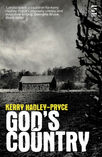Resuscitation of the Author
- Kerry Hadley
- Dec 29, 2018
- 2 min read
I read Raymond Carver's On Writing, in which he quotes this, from Flannery O'Connor where she uses 'Good Country People' as an example of how to put together a short story: 'When I started writing that story, I didn’t know there was going to be a PhD with a wooden leg in it. I merely found myself one morning writing a description of two women Iknew something about, and before I realised it, I had equipped one of them with a daughter with a wooden leg. I brought in the Bible salesman, but I had no idea what I was going to do with him. I didn’t know he was going to steal that wooden leg until ten or twelve lines before he did it, but when I found out that this was what was going to happen, I realised it was inevitable.'
Reading this has ironed things out for me as I've been editing God's Country and wondering about whether or not I've finished it, even in first draft, or not. Yesterday, I felt a sense of dread during this editing process, not so much editing as re-writing (but what's the difference, anyway?) I read the Carver thought of a first line ('He was running the vacuum cleaner when the telephone rang.') and after that one sentence ran into another, into another. I get that. I've had that happen to me with God's Country, of course, but what Carver, nor O'Connor mention is that often those run-along sentences, when you read them later? They're not so good. That is, they need tweaking.
Carver goes on a bit about 'chichi' writing - how he dislikes it when he can see a writer is, effectively, trying too hard, perhaps trying to be too clever with writerly tricks (I've been accused of this), and he talks about 'talent'. I think Barthes had something to say about that, and Foucault in their various essays on deaths of authors. I think what they're all saying is something to do with the writer (the Author with a capital A) remaining invisible rather than dead, and that the process of writing ought to be a natural process, yes, but also that the interpretation of that writing is enabled by a step across the gap between writer and reader (see Iser, on that one.) What I think I'm interested in, is how, as a writer, and knowing all this, how can I not be the sort of rinky-dink Author that Carver dislikes? Is it possible for me to be an Author-facilitator (note the capital A) or should that just not come into it? Given that I'm not just writing for 'pleasure' but to aim for 'success' (in my PhD and in my writing career). And if the Author is dead, is it time to resuscitate?









Comments